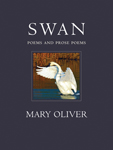Mary Oliver
Pulitzer Prize and National Book Award Winning Poet
Swan: Poems and Prose Poems
“Joy is not made to be a crumb,” writes Mary Oliver, and certainly joy abounds in her new book of poetry and prose poems. Swan, her twentieth volume, shows us that, though we may be “made out of the dust of stars,” we are of the world she captures here so vividly: the acorn that hides within it an entire tree; the wings of the swan like the stretching light of the river; the frogs singing in the shallows; the mockingbird dancing in air. Swan is Oliver’s tribute to “the mortal way” of desiring and living in the world, to which the poet is renowned for having always been “totally loyal.”
As the Los Angeles Times noted, innumerable readers go to Oliver’s poetry “for solace, regeneration and inspiration.” Few poets express the immense complexities of human experience as skillfully, or capture so memorably the smallest nuances. Speaking, for example, of stones, she writes, “the little ones you can / hold in your hands, their heartbeats / so secret, so hidden it may take years / before, finally, you hear them.” It is no wonder Oliver ranks, according to the Weekly Standard, “among the finest poets the English language has ever produced.”
Table of Contents
What Can I Say
Of Time
On the Beach
How Perfectly
How I Go to the Woods
A Fox in the Dark
Just Around the House, Early in the Morning
Tom Dancer’s Gift of a Whitebark Pine Cone
Passing the Unworked Field
For Example
Percy Wakes Me (Fourteen) Today
Swan
Beans Green and Yellow
It Is Early
How Many Days
More of the Unfinishable Fox Story
The Riders
The Poet Dreams of the Classroom
Dancing in Mexico
The Sweetness of Dogs (Fifteen)
Bird in the Pepper Tree
In Provincetown, and Ohio, and Alabama
April
Torn
Wind in the Pines
The Living Together
We Cannot Know
The Poet Dreams of the Mountain
Mist in the Morning, Nothing Around Me but Sand and Roses
The Last Word About Fox (Maybe)
How Heron Comes
When
Trees
In Your Hands
I Own a House
I Worried
Lark Ascending
Don’t Hesitate
In the Darkness
Four Sonnets
Trying to Be Thoughtful in the First Brights of Dawn
Photographs
 – Molly Malone Cook and Mary Oliver. Photo by Barbara Savage Cheresh, from Our World (Beacon Press, 2007). – Molly Malone Cook and Mary Oliver. Photo by Barbara Savage Cheresh, from Our World (Beacon Press, 2007). |
Praise
“Mary Oliver’s poems are natural growths out of a loam of perception and feeding, and feeling, and instinctive skill with language makes them seem effortless. Reading them is a sensual delight.”
—May Swenson
 Available from:
Available from: